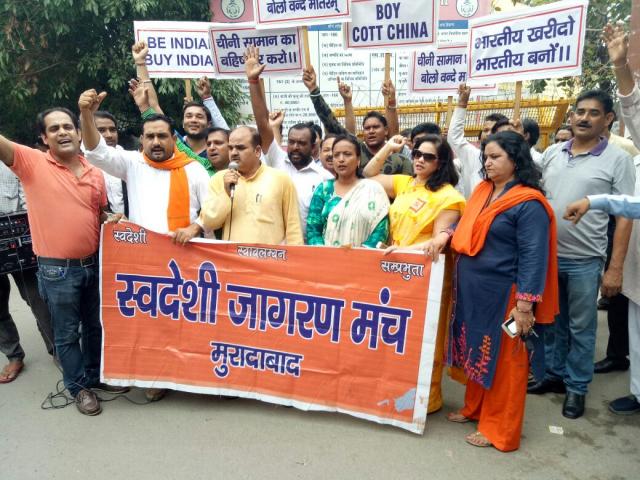
Above: Swadeshi Jagran Manch has intensified its protests against Chinese products
High GST rates on cottage industries will encourage infiltration of more Chinese goods, says Swadeshi Jagran Manch
~By Punit Mishra
The Rashtriya Swayamsevak Sangh’s (RSS) economic wing, the Swadeshi Jagran Manch (SJM), which promotes indigenous goods, has slammed the Centre by claiming that the newly-introduced Goods and Services Tax (GST) will badly hit small scale industries (SSIs) and push more Chinese goods into the Indian market instead.
SJM’s national co-convener Dr Ashwani Mahajan has claimed in an article written by him in the July edition of Swadeshi Patrika (the mouthpiece of SJM) that there is currently a provision or exemption in excise duty for production of up to Rs 1.5 crore in small scale industries.
“However, according to the provisions of GST, any entity whose business is rupees 20 lakh or more, must register itself for GST in the state where it carries its business. In the special category states, this limit is only 10 lakh rupees.
Apparently, India’s small entrepreneurs will be subjected to discrimination and confusion. Worldwide, we find exemptions for Small Scale Industries. Though in Canada SSIs are exempted up to 30,000 Canadian dollars (Rs 15.6 lakh), this limit is Rs 48 million rupees (equivalent) in Singapore and Rs 7.5 million (equivalent) in Malaysia. However, it’s only Rs 2 million in India. With small industries presently exempted up to rupees 15 million, GST does a gross injustice to SSI,” claims Dr Mahajan in the article.
Dr Mahajan also avers in the article that most of the commodities produced by SSIs have been taxed at higher rates (15 percent, 18 percent and 28 percent) making the life difficult for SSIs.
SSIs accounts for 93 percent of the employment in India and that has been grossly underestimated while deciding the tax rates for the SSIs. “While deciding about the rates of GST, due care has not been taken to keep rates low for commodities being produced by SSIs and providing huge employment.
“Beedi, fire crackers, (small scale) beverages, biscuits, pickles, confectioneries, scissors and host of other products produced by SSIs and cottage industries are attracting higher rates of GST, which is likely to affect their competitiveness,” mentions Dr Mahajan in a press release by SJM.
Dr Mahajan cites the example of the beedi industry, saying: “Beedi industry which provides direct and indirect employment to nearly 5 crore people, needs to be protected. In the new GST, beedi attracts highest tax rate of 28 per cent, endangering the employment of crores of tendu patta collectors and beedi rolling workers, especially women.
“We need to keep in mind that SSIs are of core importance for our country in terms of output, employment and exports. Moreover, we also need to keep in mind that our SSIs despite various disadvantages have been giving tough competition to the Chinese onslaught. If the new tax regime works against their (SSIs) interests, influx of Chinese products will increase, causing huge balance of payment deficit,” cautions Dr Mahajan about the detrimental effects of the tax rates on the products manufactured by SSIs in the press release.
The SJM has intensified its protests against the Chinese products. The RSS offshoot has declared the year 2017 as ‘Year of the boycott of Chinese goods and companies’. According to SJM, its signature campaign which urges boycott of Chinese goods to save the employment of India’s youth has been pledged by one crore people and the campaign is aiming to reach out to 2.5 crore people in the next few months.

